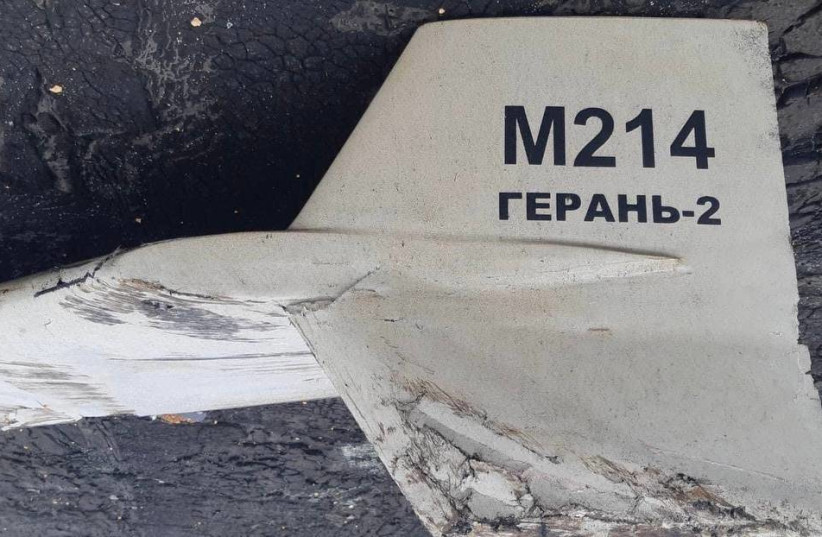Ukrainian President Volodymyr Zelensky called for Iran to be punished for its weapons sales to Russia in a speech on Sunday, following his meeting with European Commission president Ursula von der Leyen.
Zelensky said that he had discussed increasing pressure on the Islamic regime of Iran with von der Leyen.
"Its complicity in Russian terror must be punished," said Zelensky in his evening address. "And we will bring this issue not only to the level of our traditional partners. The whole world will know that the Iranian regime helps Russia prolong this war, and therefore prolong the effect of those threats to the world provoked precisely by the Russian war.
"If it was not for the Iranian supply of weapons to the aggressor, we would be closer to peace now."
The Ukrainian president added that everyone that aided Russia in its invasion of Ukraine bore responsibility for the consequences of the war.
"If it was not for the Iranian supply of weapons to the aggressor, we would be closer to peace now."
Ukrainian President Volodymyr Zelensky
Threat of Iranian suicide drones to Ukraine
Zelensky pointed to Iranian kamikaze drones as an ongoing threat to Ukrainians.

"Today, the occupiers [Russian military forces] used Iranian attack drones again. There are downed ones. But, unfortunately, there are also hits," said Zelensky.
Ukraine has been seeking to stem the supply of Iranian drones to Russia. Its intelligence directorate has been requesting information on the trade logistics of the weapons, and its special operations have claimed to have identified routes and airlines involved.
Obtaining air defenses has become a priority for Zelensky's government, which has even started a "Shahed Hunter" fundraiser, named for a series of Iranian drones, to purchase anti-drone systems through the UNITED24 government charity. Countries such as Germany and the United States have begun deliveries of anti-air systems in recent weeks.
The European Union and other states have begun to adopt sanctions against Iran's delivery of drones to Russia. Since mid-September, the US has leveled sanctions against cargo plane companies, airlines, and developers of Iranian drones.
Russia has been using Iranian suicide drones to strike Ukrainian military and civilian infrastructure since at least August, according to Ukrainian and Western intelligence, though US officials have said they have been concerned about the issue since July. Russia and Iran have repeatedly denied the defense relationship, but on Saturday Iran acknowledged that they had supplied Russia with the platforms, albeit prior to the war's beginning in February.
"Iran has provided Russia with UAVs [unmanned aerial vehicles], [and] we anticipate they'll likely seek more of those," Pentagon Press Secretary Brig. Gen. Pat Ryder said at a press briefing last Tuesday.
That day, the Ukrainian Intelligence Directorate warned that Iran is set to send over 200 combat drones to Russia at the beginning of November, including Shahed-136 and Arash-2 suicide drones and Mohajer-6 reconnaissance ones.
An earlier CNN report contended that over 1,000 weapons would soon be shipped from Iran to Russia, but the Pentagon was unable to confirm the information. According to a Wednesday Fox News report, over 3,500 drones have been sold to Russia thus far.
"Today, the occupiers used Iranian attack drones again. There are downed ones. But, unfortunately, there are also hits."
Ukrainian President Volodymyr Zelensky
Iranian missiles for Russia
On Sunday, Zelensky also said that Russia would need Iranian missiles to continue its strategy of "mass attacks on our infrastructure."
Ryder said last Tuesday "we do have concerns that Russia may also seek to acquire additional advanced munition capabilities from Iran, for example, surface-to-surface missiles to use in Ukraine," adding that in the Pentagon's assessment, Russia continues "to experience supply shortages when it comes to munitions, particularly guided munitions."
Ukrainian intelligence reported on Friday that Iranian ballistic missiles had not yet arrived in Russia, but that the contracts and agreements had been signed.
"We do have concerns that Russia may also seek to acquire additional advanced munition capabilities from Iran."
Pentagon Press Secretary Brig. Gen. Pat Ryder
The Russia-Iran military relationship
In addition to drones and missiles, the White House and official Ukrainian sources have confirmed that Iranian military personnel were on the ground in Crimea guiding and aiding Russian forces in the operation of suicide drones. According to the Ukrainian National Resistance Center, instructors from Iran’s Islamic Revolutionary Guard Corps (IRGC) are also training Russian troops on the operation of Iranian weapons in Belarus.
Iran is also supplying limited quantities of helmets and body armor, Ukrainian intelligence said at the end of October.
Russia's reliance on countries like Iran for munitions, Ryder also said last Tuesday, "says a lot about the kind of company they keep and where they stand in the world right now in terms of isolation."
